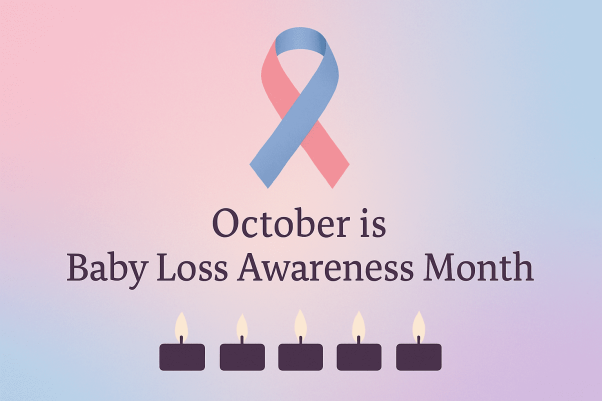
Talking about baby loss and fertility can be difficult, but it’s a reality that many employees face. From infertility struggles to miscarriage and stillbirth, the impact is far-reaching and often hidden. For employers, understanding these experiences is key to creating a workplace where people feel supported, valued, and able to cope with the challenges they face both personally and professionally.
Baby loss is far-reaching and can include:
- Fertility complications and infertility
- Miscarriage, including ectopic and molar pregnancies
- Termination of pregnancy due to fetal anomaly
- Twins or multiples loss
- Stillbirth
- Neonatal death
- Sudden and unexpected infant death
- Accidental death
The scale of pregnancy loss and baby death is significant:
- 1 in 4 pregnancies end in miscarriage
- Approximately 5,000 pregnancies per year in the UK are terminated due to fetal anomaly
- 1 in 150 babies are stillborn or die neonatally
- Around 13 babies die every day in the UK
- 1 in 7 couples are affected by infertility
Source: Sands
It is likely that employees in your company will be affected by one or more of the above. Experiences vary from person to person depending on:
- The nature of the loss
- Physical and mental health before and after the loss
- Individual coping mechanisms
- Support networks and personal beliefs
Legislation
The Parental Bereavement Leave and Pay Act 2018 (or Jack’s Law) came into effect on 6 April 2020. Key points include:
- Entitles employed parents to 2 weeks’ Parental Bereavement Leave (PBL) if they lose a child under 18 or experience a stillbirth after 24 weeks of pregnancy
- Applies from day one of employment
- Paid at the statutory rate (or 90% of average weekly earnings if lower) if:
- They’ve worked for their employer for at least 26 weeks
- Their weekly earnings exceed the lower earnings limit
Employer Support
Employees experiencing baby loss may face:
- Physical and emotional distress
- Difficulty around babies or children
- Managing funeral arrangements
- Postnatal recovery
- Grief and need for support
- Triggers such as due dates and anniversaries
- Frequent medical appointments
- Impacts on wellbeing, sleep, and work performance
- Communicating the loss to family, friends, and colleagues
Research indicates:
- Women may need up to 8 weeks off work following a miscarriage
- 10% of parents remain off work for 6 months after stillbirth
- 38% of mothers and 21% of partners reduce working hours after stillbirth
Sources: Quenby et al., 2021; Heazell et al., 2016
While not all companies can offer additional paid leave beyond statutory entitlement, they should consider:
- Flexible working arrangements
- Additional unpaid leave
- Signposting to support resources
Communication Guidance
Things to avoid saying:
- “Maybe it was meant to be.”
- “You’re still young; at least you can have more children.”
- “At least you didn’t get to know them properly.”
- “You’ll be back to normal soon.”
- “Time is a great healer.”
Supportive phrases:
- “I’m so sorry to hear that, I don’t know what to say.”
- “Do what’s right for you; we support you.”
- “Take one day at a time.”
- “Support is available.”
- “We are flexible; you are welcome to adjust your work as needed.”
Building a Supportive Workplace
Companies can provide support through:
- Compassionate pay and leave policies where possible
- Ensuring HR and line managers are trained to support employees
- Listening and being led by each individual
- Making time to talk and listen
- Being flexible as situations and feelings may change
- Following up verbal conversations in writing and sharing information clearly
Fertility Journey
Infertility affects approximately 15% of the world’s population, and in the UK around 50,000 people undergo fertility treatment annually (HFEA). Fertility treatment can be emotionally, physically, and financially demanding, and companies should:
- Be supportive and understanding
- Allow time off for treatment and recovery
- Recognise the potential impact on employee wellbeing and performance

Baby Loss Awareness Month – October 2025
October is Baby Loss Awareness Month, a time to raise awareness and support those affected by pregnancy loss and infant death. Employers are encouraged to:
- Recognise the month through internal communications
- Offer awareness resources and support information to employees
- Promote a culture of openness and compassion around fertility and loss
Participating in Baby Loss Awareness Month can help reduce stigma, increase understanding, and provide much-needed support to employees facing these experiences.
Baby loss and fertility struggles touch more lives than many realise, and the workplace can play a vital role in providing comfort, flexibility, and understanding. By raising awareness, training managers, and showing compassion, employers can help reduce stigma and create a culture where employees don’t feel alone in their experiences. Supporting people through some of the most difficult moments of their lives isn’t just about policies – it’s about empathy, humanity, and care.
